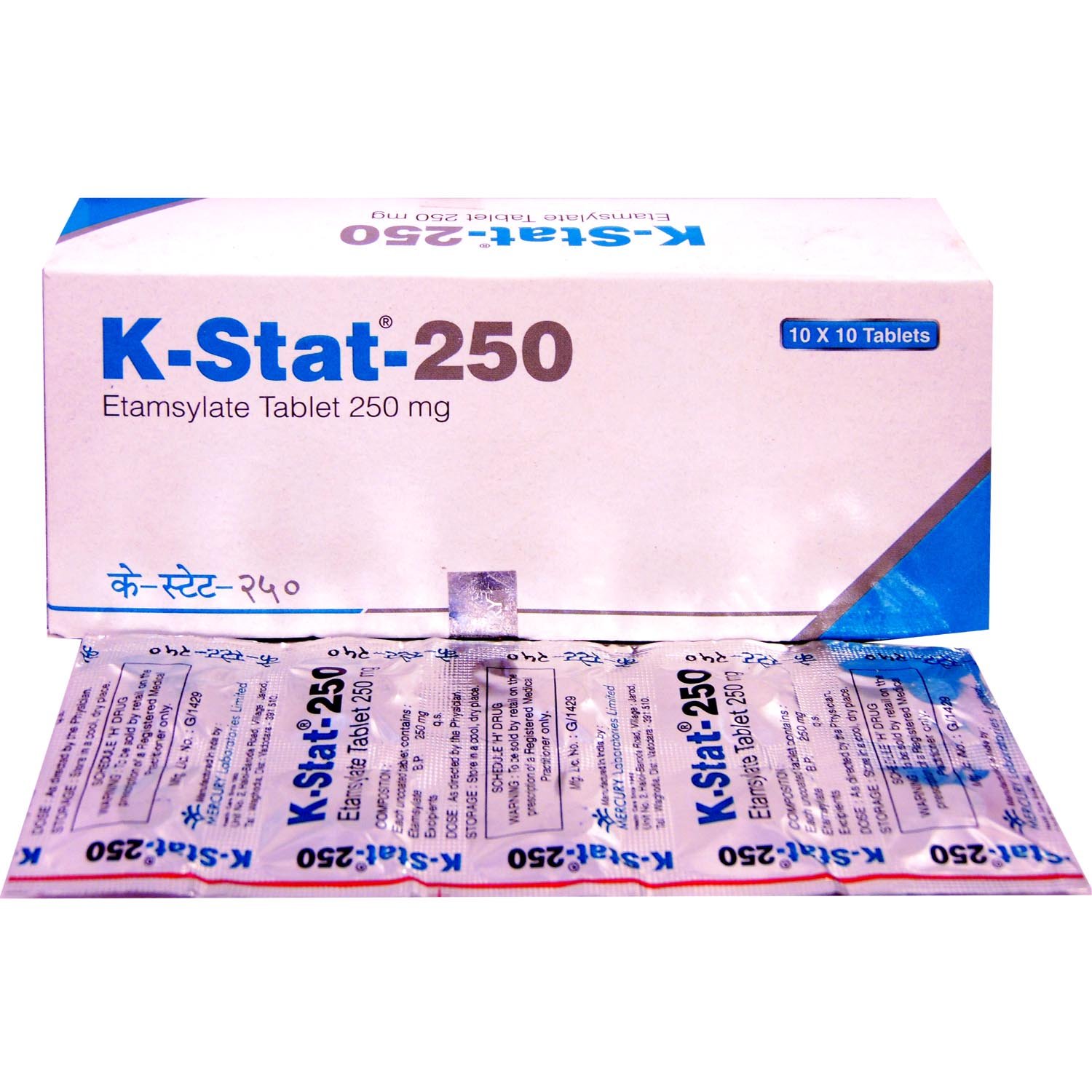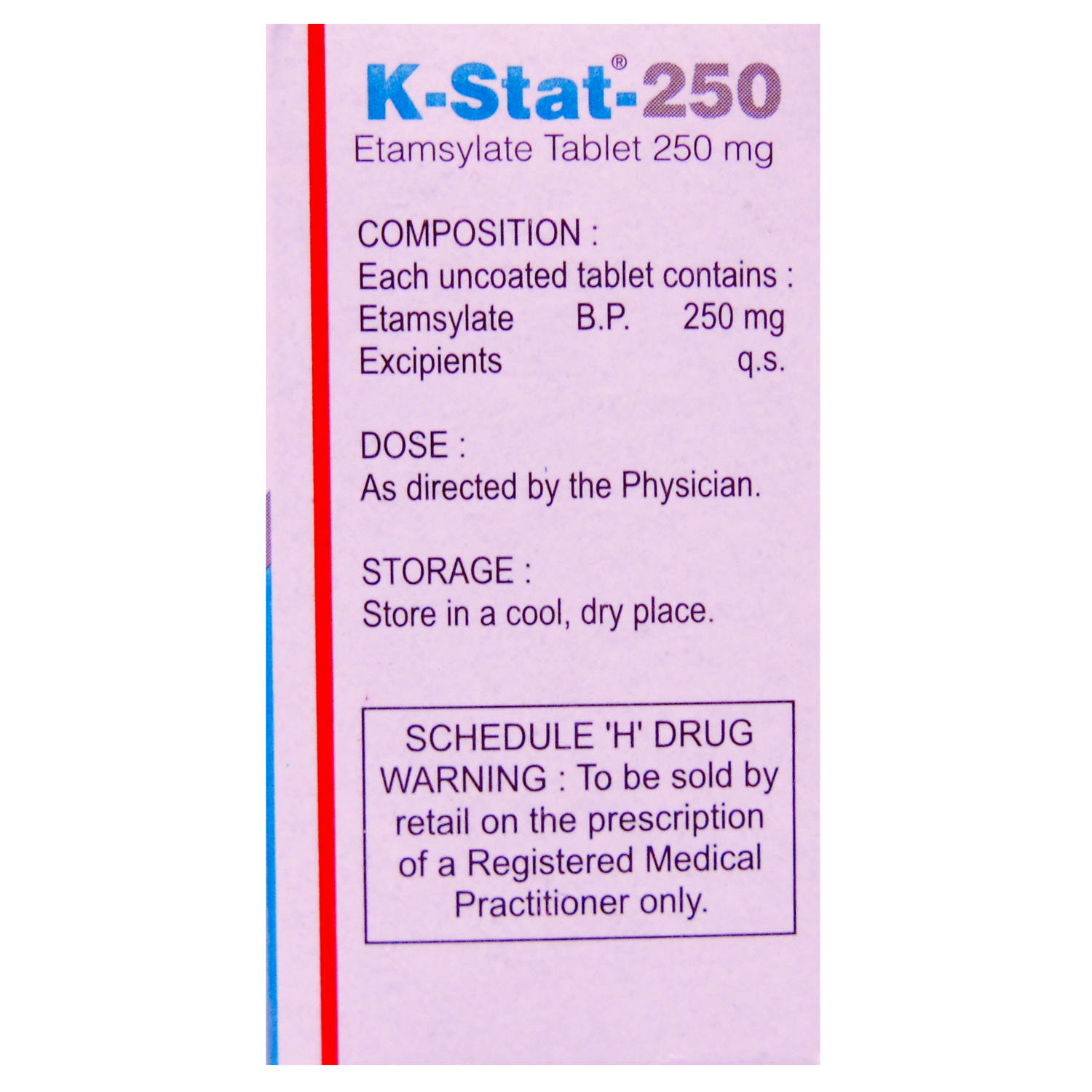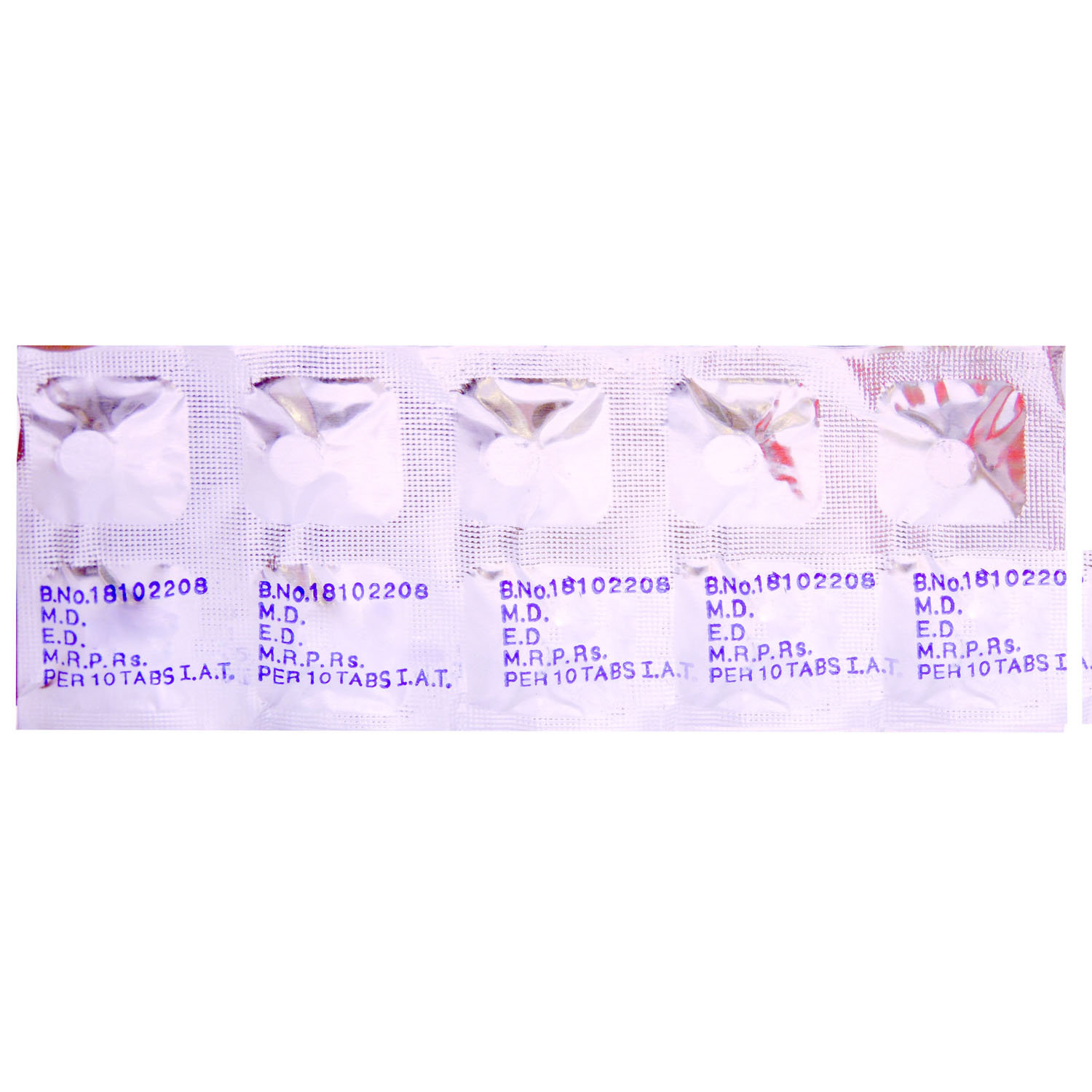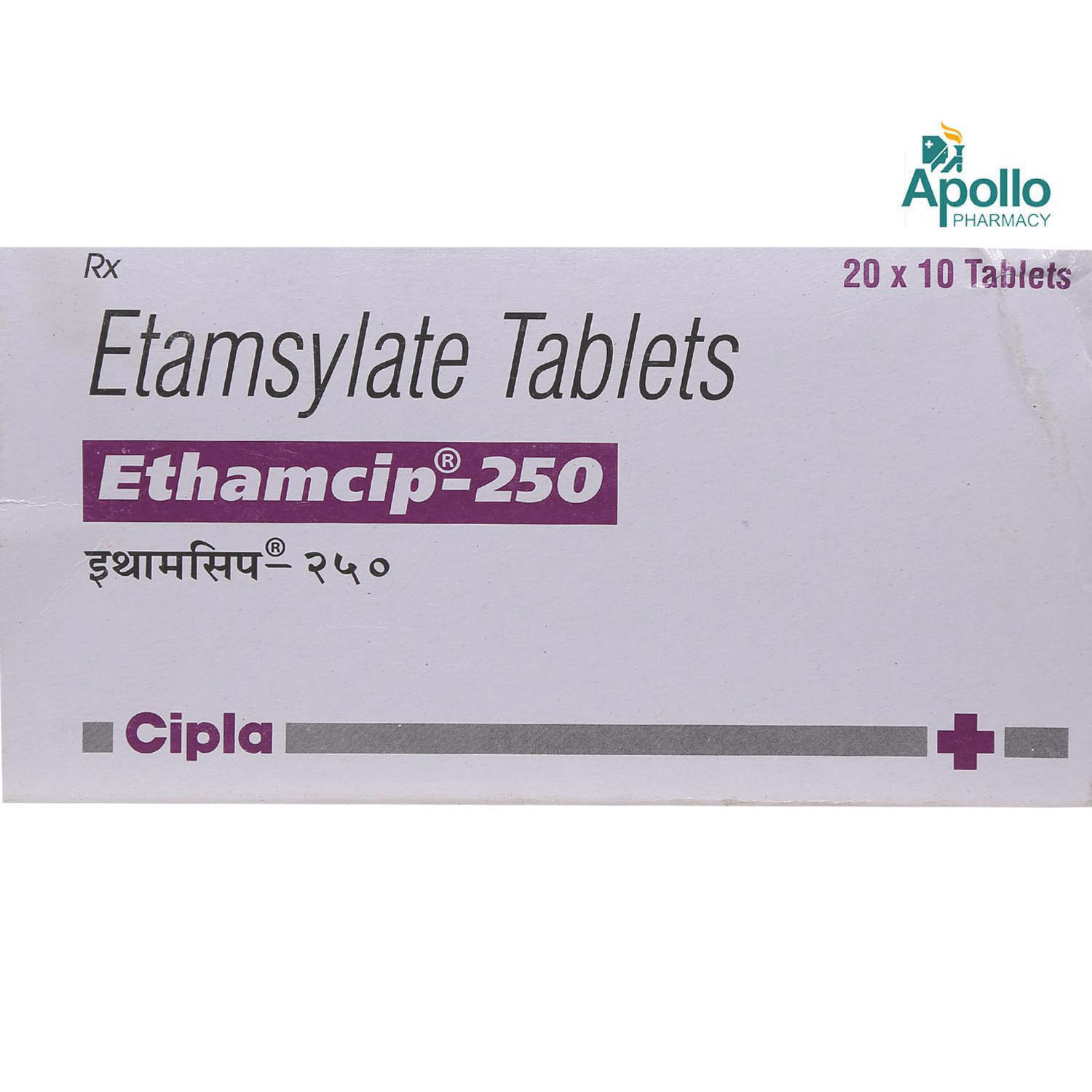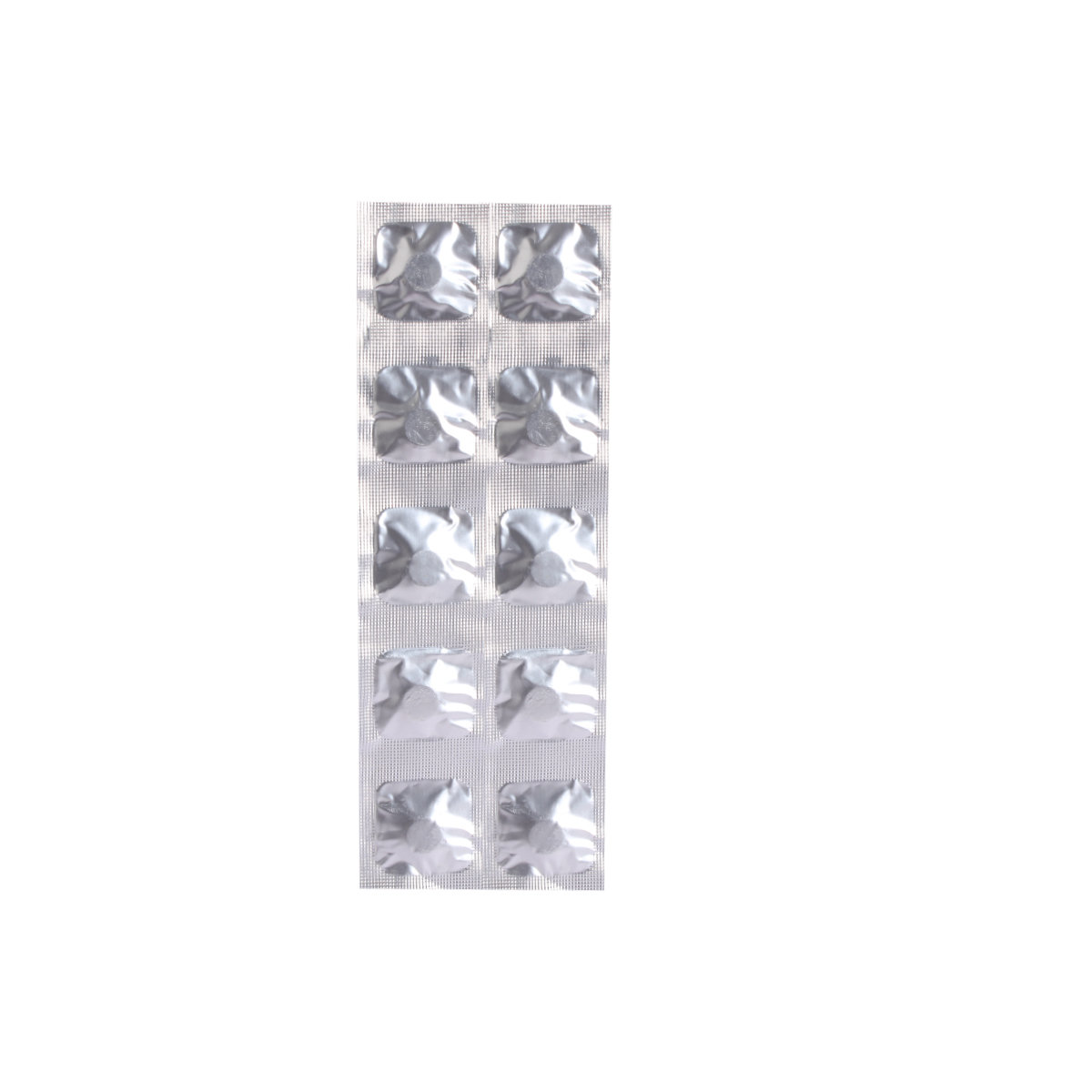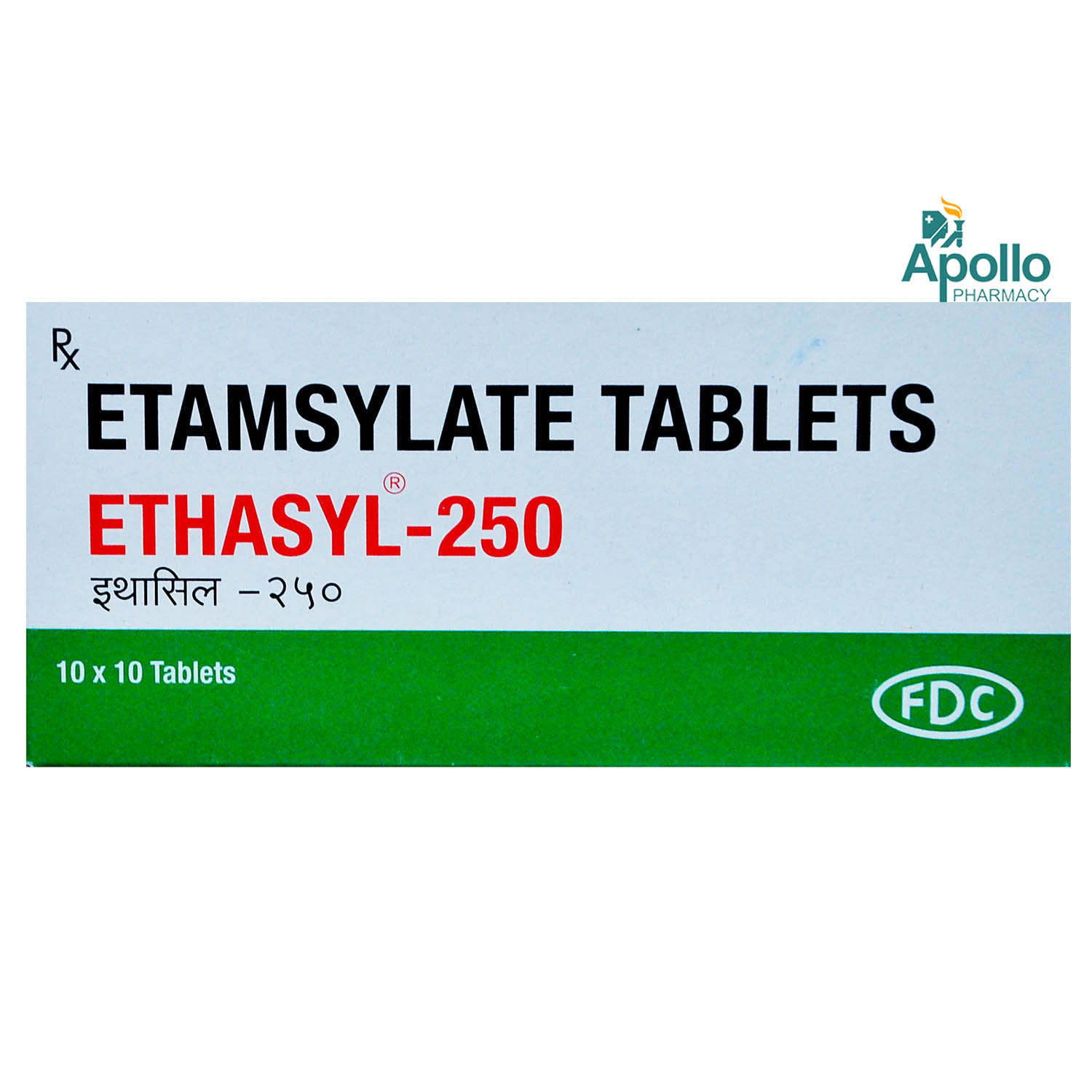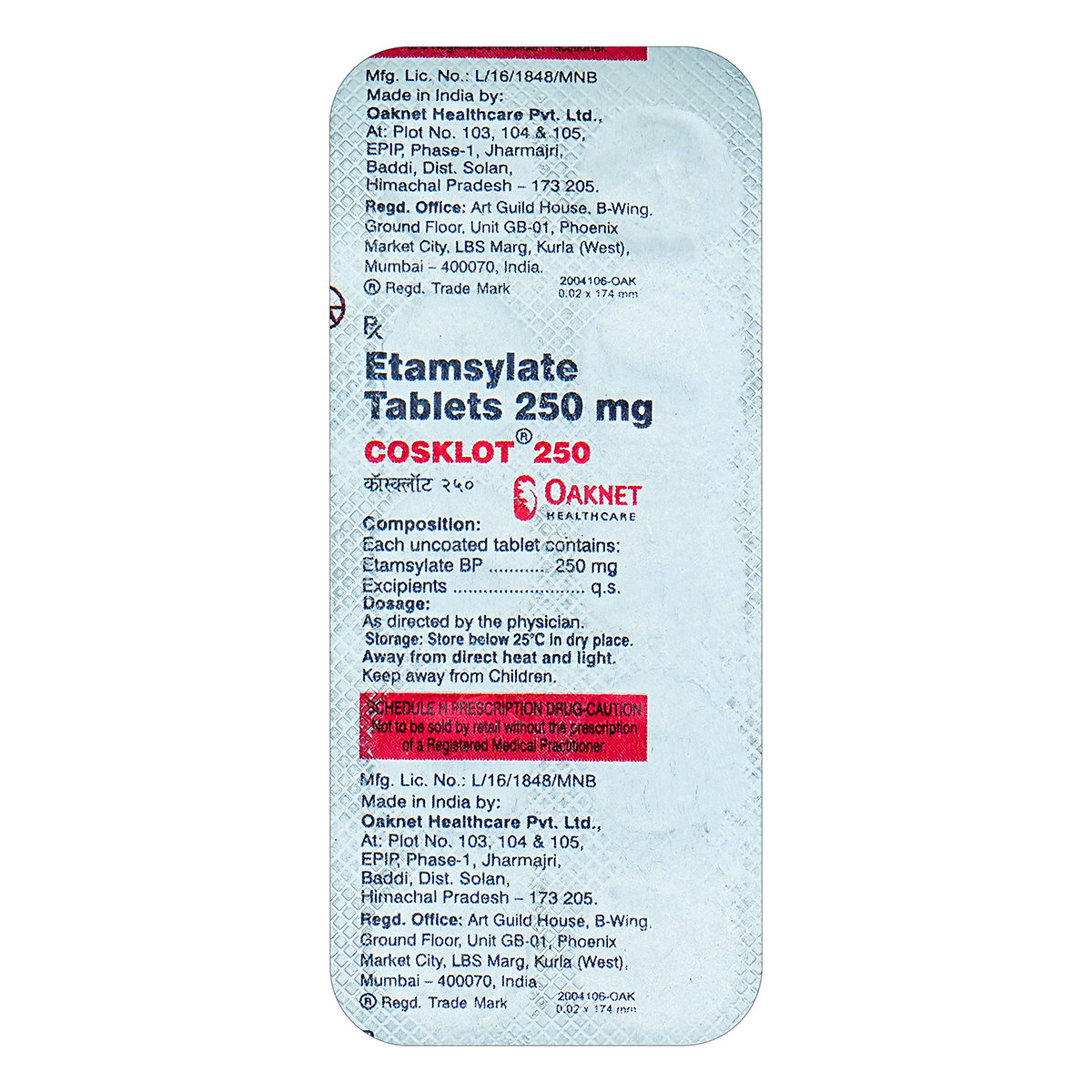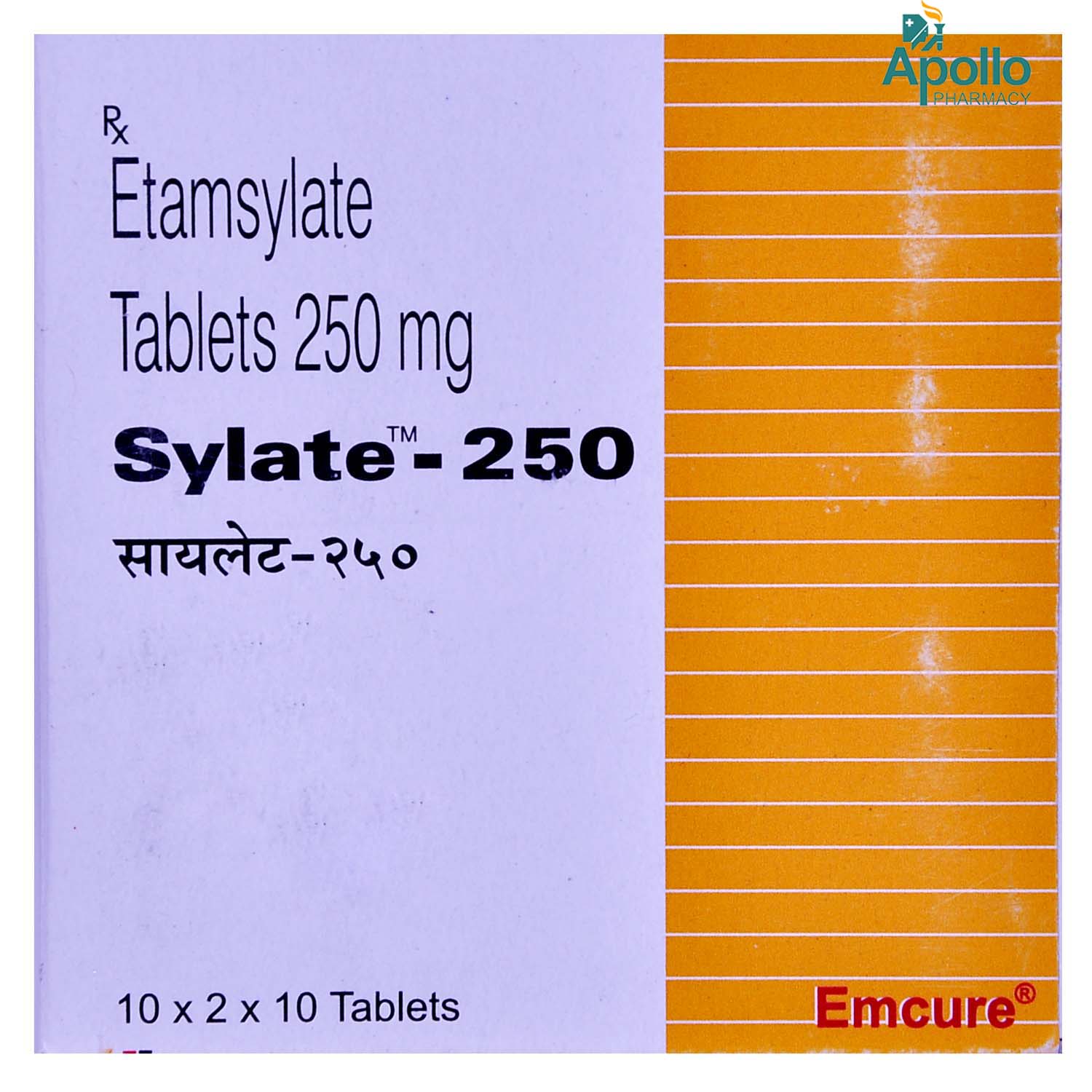K-Stat 250 Tablet 10's
MRP ₹138.5
(Inclusive of all Taxes)
₹20.8 Cashback (15%)
Provide Delivery Location
Online payment accepted
 Prescription drug
Prescription drugWhats That
Composition :
Manufacturer/Marketer :
Consume Type :
Expires on or after :
Return Policy :
About K-Stat 250 mg Tablet
K-Stat 250 mg Tablet belongs to the class of antihemorrhagic drugs. It is indicated in the treatment of small vessel haemorrhage menorrhagia (menstrual bleeding that lasts more than 7 days) including IUD users and prophylaxis of periventricular haemorrhage in neonates. It prevents and controls bleeding from small blood vessels and neonatal intraventricular haemorrhage. Besides this, K-Stat 250 mg Tablet can prevent periventricular haemorrhages in prematurely born children.
K-Stat 250 mg Tablet contains Etamsylate, a hemostatic agent that improves platelet adhesion by restoring capillary resistance and improving platelet adhesion. On the other hand, this medicine also inhibits the biosynthesis and action of prostaglandin. These effects help to decrease abnormal bleeding.
K-Stat 250 mg Tablet should be used as prescribed by the physician. K-Stat 250 mg Tablet may cause side effects such as headache, skin rash, nausea and low blood pressure. These side effects are short and may go away with time; however, if they continue, consult a doctor.
Inform your doctor if you are allergic to any medications and foods, if you have acute porphyria, fever, non-cancerous growths or blood pigment disorder, or if you are pregnant or breastfeeding. K-Stat 250 mg Tablet is not recommended to use before the onset of bleeding during periods, so inform your doctor about your condition. And also, notify your doctor about your current list of medications, pre-existing diseases, and current health conditions (e.g. pregnancy, upcoming surgery, etc.) in order to rule out any potential negative effects.
Uses of K-Stat 250 mg Tablet
Directions for Use
Key Benefits
K-Stat 250 mg Tablet contains Etamsylate, a hemostatic agent that improves platelet adhesion by restoring capillary resistance and improving platelet adhesion. On the other hand, K-Stat 250 mg Tablet also inhibits the biosynthesis and action of the prostaglandin. These effects help to decrease abnormal bleeding. Thus it treats, controls, and improves various disease conditions and symptoms.
Storage
- Inform your doctor about the nausea and discuss possible alternatives to the medication or adjustments to the dosage.
- Divide your daily food intake into smaller, more frequent meals to reduce nausea.
- Opt for bland, easily digestible foods like crackers, toast, plain rice, bananas, and applesauce.
- Avoid certain foods that can trigger nausea, such as fatty, greasy, spicy, and smelly foods.
- Drink plenty of fluids, such as water, clear broth, or electrolyte-rich beverages like coconut water or sports drinks.
- Use ginger (tea, ale, or candies) to help relieve nausea.
- Get adequate rest and also avoid strenuous activities that can worsen nausea.
- Talk to your doctor about taking anti-nausea medication if your nausea is severe.
- Record when your nausea occurs, what triggers it, and what provides relief to help you identify patterns and manage your symptoms more effectively.
Drug Warnings
Before prescribing the K-Stat 250 mg Tablet , let your doctor know if you are allergic to any medications and foods if you have acute porphyria, bronchial asthma, fever, non-cancerous growths or blood pigment disorder, or if you are pregnant or breastfeeding a baby. K-Stat 250 mg Tablet is recommended not to use before the onset of bleeding during periods, so inform your doctor about your condition. And also, inform your doctor about your current list of medications (including vitamins and supplements), pre-existing diseases, and current health conditions (e.g. pregnancy, upcoming surgery, etc.) in order to rule out any potential negative effects.
Drug-Drug Interactions
Drug-Drug Interactions
Login/Sign Up
Drug-Food Interactions
Drug-Food Interactions
Login/Sign Up
Diet & Lifestyle Advise
- Maintain a healthy weight. Stay physically active.
- Consume fresh fruits and vegetables. Avoid spicy, salty, and deep-fried foods. Eating healthy can help you to recover faster.
- Avoid tea, coffee, and cold drinks.
- Drink plenty of fluids to stay hydrated. Fluids are necessary to maintain blood flow in your body.
- Avoid the intake of alcoholic beverages as it can make you dehydrated and also can affect your sleep.
- Avoid physical and psychological stress.
Side Effects of K-Stat 250 mg Tablet
- Headache
- Skin Rash
- Nausea
- Low Blood Pressure
Habit Forming
Therapeutic Class
All Substitutes & Brand Comparisons
RX
SYL 250MG TABLET
₹54.5
(₹4.91 per unit)
60% CHEAPERRX
Out of StockEthamore 250 Mg Tablet 10's
Morepen Laboratories Ltd
₹62
(₹5.58 per unit)
55% CHEAPERRX
Out of StockOrsik-E 250 mg Tablet 10's
Ornate Labs Pvt Ltd
₹69
(₹6.21 per unit)
50% CHEAPER
Author Details
We provide you with authentic, trustworthy and relevant information
Drug-Diseases Interactions
Drug-Diseases Interactions
Login/Sign Up
FAQs
Disease/Condition Glossary
Bleeding disorders: Bleeding disorders are a group of diseases that occur when the blood fails to clot properly. Platelets, a type of blood cell, stick together and form a plug at the site of an injured blood vessel during normal clotting. Clotting factors, which are proteins in the blood, then interact to form a fibrin clot, which is essentially a gel plug that holds platelets in place and allows healing to occur at the site of the injury while preventing blood from escaping the blood vessel. While excessive clotting can result in conditions such as heart attacks and strokes, the inability to form clots can be equally dangerous, resulting in excessive bleeding. Bleeding can occur as a result of insufficient or abnormal platelets, insufficient or abnormal clotting proteins, or abnormal blood vessels.
Haemorrhage menorrhagia: Menstrual periods with very excessive or protracted bleeding are known medically as menorrhagia. Despite the fact that most women worry about their periods being heavy, menorrhagia is not a regular occurrence in most women.
Neonatal intraventricular haemorrhage: A newborn’s intraventricular haemorrhage (IVH) is bleeding into the fluid-filled regions, or ventricles, that surround the brain. The condition is more common in preterm babies, and the smaller and more premature the infant, the greater the risk for IVH. This is due to the fact that blood vessels in premature infants' brains have not yet fully matured and are extremely fragile. IVH is rarely present at birth, and if it does occur, it is usually in the first few days of life.
Periventricular-intraventricular haemorrhage is a disorder that primarily affects premature newborn infants born before 33 weeks of gestation. Haemorrhage develops when arteries in the periventricular portion of the germinal matrix break and expand into the intraventricular space. Periventricular haemorrhage occurs when bleeding extends into the intraparenchymal area next to the ventricle.

Have a query?
Alcohol
Safe if prescribed
The interaction of alcohol with K-Stat 250 mg Tablet is unknown. Please consult a doctor if you have any concerns.
Pregnancy
Consult your doctor
Inform your doctor if you are pregnant or suspect pregnancy. Your doctor will weigh the benefits and potential risks before prescribing K-Stat 250 mg Tablet .
Breast Feeding
Consult your doctor
Inform your doctor if you are a nursing mother. Your doctor will weigh the benefits and potential risks before prescribing K-Stat 250 mg Tablet .
Driving
Safe if prescribed
K-Stat 250 mg Tablet has no or negligible influence on the ability to drive and operate machines.
Liver
Consult your doctor
If you have or history or evidence of liver disease, please inform the doctor before prescribing K-Stat 250 mg Tablet . Your doctor may adjust the dose based on your condition.
Kidney
Consult your doctor
If you have or history or evidence of kidney disease, please inform the doctor before prescribing K-Stat 250 mg Tablet . Your doctor may adjust the dose based on your condition.
Children
Safe if prescribed
Etamsylate should be used in children and neonates under the supervision of a doctor.

